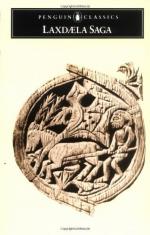CHAP. XXVI
The Death of Hoskuld, A.D. 985
[Sidenote: Hoskuld’s death] Hoskuld, Koll o’ Dales’ son, fell ill in his old age, and he sent for his sons and other kinsfolk, and when they were come Hoskuld spoke to the brothers Bard and Thorliek, and said, “I have taken some sickness, and as I have not been much in the way of falling ill before, I think this may bring me to death; and now, as you know, you are both begotten in wedlock, and are entitled to all inheritance left by me. But there is a third son of mine, one who is not born in wedlock, and I will ask you brothers to allow him, Olaf to wit, to be adopted, so that he take of my means one-third with you.” Bard answered first, and said that he would do as his father wished, “for I look for honour from Olaf in every way, the more so the wealthier he becomes.” Then Thorliek said, “It is far from my wish that Olaf be adopted; he has plenty of money already; and you, father, have for a long time given him a great deal, and for a very long time dealt unevenly with us. I will not freely give up the honour to which I am born.” Hoskuld said, “Surely you will not rob me of the law that allows me to give twelve ounces to my son, seeing how high-born Olaf is on his mother’s side.” To this Thorliek now agreed. Then Hoskuld took the gold ring, Hakon’s gift, that weighed a mark, and the sword, King’s gift whereon was half a mark of gold, and gave them to Olaf, his son, and therewith his good luck and that of the family, saying he did not speak in this way because he did not know well enough that the luck had already come to him. Olaf took his gifts, and said he would risk how Thorliek would like it. Thorliek liked it very ill, and thought that Hoskuld had behaved in a very underhand way to him. Olaf said, “I shall not give up the gifts, Thorliek, for you agreed to the gift in the face of witnesses; and I shall run the risk to keep it.” Bard said he would obey his father’s wishes. [Sidenote: The funeral feast postponed] After that Hoskuld died, and his death was very much grieved for, in the first place by his sons, and next by all his relations and friends. His sons had a worthy cairn made for him; but little money was put into it with him. And when this was over, the brothers began to talk over the matter of preparing an “arvale” (burial feast) after their father, for at that time such was the custom. Olaf said, “It seems to me that we should not be in a hurry about preparing this feast, if it is to be as noble as we should think right; now the autumn is very far worn, and the ingathering of means for it is no longer easy; most people who have to come a long way would find that a hard matter in the autumn days; so that it is certain that many would not come of the men we most should like to see. So I will now make the offer, next summer at the Thing, to bid men to the feast, and I will bear one-third of the cost of the wassail.” The brothers




